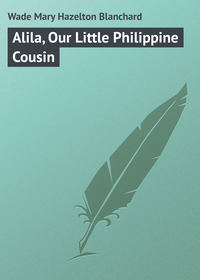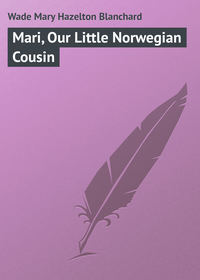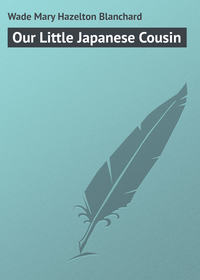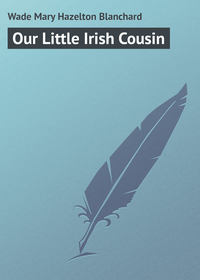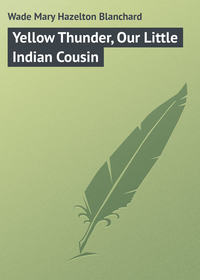 полная версия
полная версияOur Little Eskimo Cousin

Mary Hazleton Wade
Our Little Eskimo Cousin
Preface
It is a very wonderful thing, when we stop to think of it, that no matter where we are placed in this great round world of ours, it seems just right to us.
Far away in the frozen north, where the lovely aurora borealis dances in the sky, where the long sunless winter night stretches halfway across the year, live a people who cannot keep themselves alive without working very hard. Yet they are happy and fun-loving. They make pleasures for themselves. They are patient and joyous in the midst of darkness and storm. They do not think of complaining at their hard lot, or that they do not live where Nature is kinder and more generous.
We call them Eskimos. They belong to another race than ours, – a different branch of the great human family. They are yellow and we are white, to be sure. But we know that, no matter how far away any race of people lives, and no matter how different these people may be from us in looks and habits, they and we belong to the same great family. It includes every race and every colour, for we are the children of one Father.
What a pleasure it is, therefore, to travel from place to place and see more of the life of others! But suppose we cannot journey with our bodies; we need not stay at home on that account. Let us use the wings of the mind, and without trouble or expense visit the hot lands and the cold, the yellow children and the red. Let us know them and learn what they can teach us.
CHAPTER I.
BABY DAYS
A pair of very bright black eyes peered out from the mother's hood that winter morning. The thermometer, if there had been one, would have shown the temperature to be seventy degrees below the freezing point.
Yet baby Etu did not seem to care. He was nestled so warmly in the heavy furs, and felt so safe on his mother's broad back, that he laughed and crowed in pure delight.
It was his first ride since he was born, and there was so much to look at! At least he thought so, though great sheets of snow stretched outward to the frozen ocean, and covered the land in every direction. The twinkling stars gave the only light for Etu to see by, yet it was daytime. It was that part of the twenty-four hours when the baby's people did their work; and that must be called day in Etu's far northern country, even though darkness covers all the land.
For Etu lives in the frozen zone, on the shores of northern Alaska, and during the long winter of eight months the sun shows his face very little above the horizon.
Here and there the snow looked as if it had been raised into low mounds. Near these mounds holes could be seen in the ground, and pathways dug out between them. There were no trees, no fences, no roads.
Where was the village, and where was the baby's home? Those holes marked the entrances to the winter houses built by Etu's father and his neighbours. The mounds were the coverings of the houses. Great pits had been dug in the earth, and lined with driftwood which had floated on to the shore. Jaws of whales made the framework of the roofs, these being covered with sods cut out of the marshy plains in summer. Mother Nature did the rest by protecting all with a warm close blanket of snow.
At first it makes one shudder to think of living in such homes during the long Arctic winter. But the Eskimos are satisfied, and feel so comfortable that they remove a great part of their clothing while they are indoors. The houses are made so snug that the sharpest winds cannot enter, and they cost nothing but the labour of making them.
Etu's mother allowed him to stay out only a few minutes this first time. She soon turned toward home, and coming to her own doorway crawled down through a long slanting tunnel in the ground, eight or ten feet long. When she reached the end, she was obliged to stoop even lower, for now she must pass upwards through another passage. Lifting a trap-door, she stepped at once into the middle of her own home.
Why was there such a queer entrance? Because the wind must be kept out at all hazards. After all, it seemed easy and natural enough to this woman who had never known other and pleasanter hallways.
How close it seemed after the fresh cold air outdoors! There was a strong odour of smoking oil. It was noisy, too, as other women and children were moving around inside, for the house was shared in common by several families who were friendly to each other, and enjoyed living together.
Etu's mother quickly took off her outer coat of sealskin, and, lifting her baby out of his warm nest, placed him on a platform which stretched along one side of the room. What a round, smiling dumpling he was! His face was broad and flat, while his little nose looked as though it had been punched inwards. His bright eyes were quite narrow.
He wore a curious skin cap drawn tightly over the top of his head. He must keep this on night and day for a year, at least. It would make his forehead taper upward, and that is a mark of beauty among his people. As soon as he was born, the top of his head was pressed between his nurse's hands, and the cap fitted on at once so that his head might grow in the proper shape. After that operation he was taken outdoors, and rolled in the snow. I suppose that was to get him used to the cold climate of his birthplace. Don't you?
Baby Etu's skin was much whiter than his mother's, – very nearly as white, in fact, as your own little brother's. Why has he changed so much since he has grown to be a big boy? Listen to the strange reason.
When our Eskimo cousin was born, there was a small dark spot on his back. Day by day it grew larger; the change came very slowly, so slowly it could scarcely be noticed. But at last the darker colour had spread over the boy's whole body, till his skin was nearly like that of his father and mother.
In course of time it would grow darker still, because he did not wash himself. Please don't be shocked. It is so hard to get water in that frozen land. Snow must first be melted, and to do this heat is required. Heating requires the burning of oil, and oil is very precious. It is scarcely any wonder, therefore, that Etu has not been taught to be cleanly in all ways.
The smoky air of the home during the long winter months also made the boy's skin grow darker. Sometimes during his babyhood his mother would wash him as a mother cat washes her kittens, but that was all he has ever known of the delights of a bath. The mother-love made that pleasant, perhaps, but we cannot envy him.
It was quite surprising to an Arctic explorer some years ago, when he discovered the difference soap and warm water would make in an Eskimo's appearance.
"Why, you are almost a white man," he exclaimed, "your friends will think you have been changed into another being by some magical spell." And he laughed heartily when he thought of the only magic being soap and water.
Etu tumbled about on the sealskins which covered the platform, watching his mother while she trimmed the wick of the lamp. What an odd-looking lamp it was! It was made of a crescent-shaped stone hollowed out. Think of the labour of making it! It must have taken days, and even weeks, before the cavity was hollowed enough to hold the oil. But Etu's people are such patient workers they do not worry over the time they spend.
Moss was built up around the sides of the lamp; it served for the wick which spluttered away as the oil burned and warmed the room. A lump of seal fat, or blubber as it is called, hung over the lamp. As it melted slowly in the heat, it dripped down into the cavity and furnished a steady supply of oil.
There were two other lamps burning in Etu's home, for you must remember there was a very large family living here. And these queer lamps not only gave light and warmth to all these people, but the cooking must also be done over them.
Etu watched the light with blinking eyes for a few moments, and then fell fast asleep. Only think of it, he was nearly naked! There was no covering on his tiny body except a short skirt of fur, – his arms and legs were quite bare, yet his loving mother did not hurry to cover him over. He must get used to cold while he was still small, so that when he grew older he could bear exposure better.
CHAPTER II.
MOTHER AND CHILD
The mother was proud that this first baby was a boy. She liked to dream of what a great hunter he would become. In a few years he would do his part to keep the wolf from the door, in more senses than one. He would bring home the seal, the walrus, now growing so scarce, the grim white bear, and make many a feast for his people. Oh, no, girls could never do such things as these! She was a happy woman, indeed.
This Eskimo mother had a pleasant, sunny face, even though the chin was tattooed with three long lines from the mouth downwards. She firmly believed that it would be looked upon as a sign of goodness, when she reached the next world. It might help in bringing her to heaven.
The work was done by her own hands and must have been quite painful. The sinew of a reindeer furnished the thread which she blackened with soot. Fastening it in her bone needle, she drew it under and through the skin till the lines were plainly marked. They would stay that way as long as she lived.
She bustled about at her work without fuss or hurry. More than once the children playing in the room got in her way, but she did not scold nor even look cross. Now and then a hungry-looking dog poked his head up through the doorway, only to be chased out of sight again when discovered. As she worked she joined in the laughter and talk of the women.
Hark! the sound of many feet could be heard, and the women and children stopped their chatter to welcome the men of the household, who had been away on a bear hunt for many hours.
"What luck? What luck?" all said at once, but there was no story of brave fighting to tell this night; the long march over the icy plains had met with no reward. But there was no danger of starving at present, for great dishes of smoking seal soup stood ready for the hunters.
In a few minutes all the household were squatting on the floor around the bowls. They ate the delicious supper to their hearts' content; and how they did eat! It seemed as though their stomachs must be made of elastic, for otherwise how were they able to stow away such immense quantities of the rich, fatty food?
With Etu's people it is either a feast or a famine all the time. They have no regular time to eat, no such thing as breakfast, dinner, and supper. If there is a good supply of food on hand, they will keep on eating hour after hour in a way to fill other people with wonder. But if there is nothing in the larder they are able to go several days without eating; yet they seem to keep well and strong.
All were satisfied at last, and baby Etu waked up in time to be held and petted for a while before bedtime.
His mother did not have any dishes to wash, but before she could settle herself for the night she had to arrange a net over the seal-oil lamp, and spread her husband's wet clothing in it to dry. She must rouse herself during the night to watch and turn it from time to time, for that is a woman's work, she has been taught.
But where were all these people going to stow themselves for sleeping? There was no sign of a bed in the whole house. That question was easily settled, for a portion of the platform was set aside for each family. They arranged their fur rugs upon it, and crept in side by side. Then, taking off all their clothing, they buried themselves under the warm covers. First in order lay the father of a family, next came the mother, and close to her the youngest child was always nestled.
Baby Etu slept, warm and safe, that night and many afterward. Not once during the long winter did he cry from colic.
As soon as he was able to sit up alone his mother gave him lessons in what he needed most, – strength of body, and ease in moving every muscle. She would sit on the floor or platform and stretch out her legs in front of her. Then she would brace Etu against her feet, and, holding his hands, would bend his arms in every possible direction. Now they must be stretched upwards, now to the right, the left, behind him, and so on. This would make him agile in hunting.
As soon as the baby could walk he began to have other exercises for his legs, for he must make a good runner and dancer, also.
As soon as Etu began to take more notice of those around him, he received many presents of toys. There were animals carved out of ivory, – tiny whales and walruses, baby seals and reindeer. He could not break them easily. They were fine things to press against his aching gums when the first teeth pushed themselves into sight. If he had been a girl he would have had an ivory doll, with a little dress of mouse skin, but, of course, a boy would not care for such a plaything. It was not to be thought of.
Soon the time came for his first suit of clothes, and, oh, how many days of patient work his mamma spent on those little garments!
In the first place, there must be some long stockings of reindeer skin, so made that the hairy side lay next his body. After that came socks of the skin taken from eider-ducks. And outside of all he must wear stout boots of sealskin with soles of thick whale hide. He must draw these up to his hips over his two pairs of deerskin trousers, just as his father and mother themselves did. His jacket was made of reindeer skin, with a warm hood fastened to it to draw over his head while outdoors in the searching winds. It had no buttons either before or behind, but fitted quite loosely.
Some one asks: "How did he get into this garment, since there were no openings except for the neck and sleeves?" He slipped it down over his head, as American boys put on their jerseys. The skin had been tanned and stretched and softened so beautifully by his mother that it was quite easy to do this.
The baby's jacket was shaped round exactly like his father's, while his mother's had a long pointed tail both in front and behind. Besides this difference, her own jacket is always trimmed with a fringe of coloured beads bought of the traders. This fringe reaches around the neck, and also around both of the tails. It is very beautiful, her neighbours all declare.
It seems quite wonderful to us that Etu's boots could be perfectly water-tight, although they were home-made. This Eskimo mother is such a fine seamstress with her coarse needle and thread, that a drop of water cannot enter the skin boots after her work is done.
When his first suit was entirely finished, and Etu was dressed, he was ready for the coldest weather. As soon as he could walk easily, he had no more need to ride in the warm hood on his mother's back. There were times before this, however, when he cried with the cold even in that snug place, and his mother had been obliged to stop in her walk, loosen her jacket, and slip the baby inside of all her clothing next to her own warm body. After that the crying would stop, and Etu would coo softly as the two went on their way.
How many things had to be done before the baby's suit was finished! In the first place, his papa must kill the animals which furnished the warm skins. But when that was done, his work was over. It was his wife's turn now. She removed the skins from the dead reindeer and seal, and stretched them out to dry, with the hairy side toward the earth.
After a few days they were ready for her to begin the hardest part of the task. They must be scraped with a sharp knife until every atom of flesh should be removed, as well as the inner tough skin. Now they were flexible enough for all the clothing except the stockings, and these must be very soft indeed for the tender baby feet. A piece of the skin of a baby deer was chosen by the careful mother, who next proceeded to chew it, inch by inch. Her teeth were beautifully white and sharp, but the work was done so carefully that no hole, nor even mark, could be seen in the skin when it was finished.
She was ready now to cut out the various garments with her odd scissors, – but, after all, it is wrong to call the queer knife she uses by the name of scissors. She speaks of it as an "oodlo," and it is useful in so many ways, she really could not keep house without it. It is shaped much like your mother's meat-chopper. It is made of bone edged with iron, and when Etu's mother cuts with it, she moves it away from her in a way which looks very awkward to us. It not only takes the place of scissors, but is the hatchet, the knife, and also scraper with which the flesh is removed from the skins.
CHAPTER III.
PLAY-DAYS
Month after month passed by with baby Etu. The little round ball grew into a sturdy boy, who delighted in rough plays outdoors, as well as many indoor games, when the storms raged too greatly for him to leave the house.
His mother never refused him anything possible to get. He was never scolded or punished, so it is no wonder he grew up kind and honest and truthful. And laugh? Why, you can't imagine how many things there are for Eskimo children to laugh about. In that cold and dreary land one would expect to see long faces, and hear people constantly groaning and complaining; but, instead of that, these people of the far north may be said to be ever "on the grin," as travellers there have often expressed it.
And Etu was like the rest of his people. He was always finding some new source of fun and pleasure. When he was still a tiny baby, left to amuse himself on the platform inside the house, he would watch for the dogs to appear in the passageway, and throw his ivory toys at them. Then he would laugh and shake his sides as they dodged the play-things and scampered away.
Sometimes one of the older children would bring him a ball of snow or ice and teach him to kick it into the air again and again, without touching it with his hands, yet keeping it in motion all the time.
When he grew older and braver he allowed himself to be tossed up in the air in a blanket of walrus hide. He must keep on his feet all the time, and not tumble about in the blanket. After awhile he could go almost to the roof and back again, holding himself as straight as a little soldier.
Of course he slid down-hill and had any amount of sport, but the sled was generally the seat of his own deerskin trousers. He and his playmates liked to start from the top of an icy hill, and vie with each other in reaching the foot.
Sometimes the little fellows would double themselves up so they looked like balls of fur, then down the hill they would roll, over and over, one after another. And when they reached the bottom and jumped upon their feet, what a shouting there would be as they shook themselves and brushed off the snow!
Now that Etu is a big boy, he plays still another game on the snowy hillsides. His father has killed a great number of reindeer, and the boy is allowed to have all the antlers he wishes. When the boys want to play the reindeer game, as we may call it, they set up the antlers in the snow, a short distance apart from each other. Then they climb the hill again, and, seating themselves on their sleds, slide down past the antlers. They must steer clear of them and reach the foot without running into a single one. At least, that is the game, and the ones who do so successfully are the winners.
But what kind of a sled do you think Etu uses? It is simply a cake of ice; if you stop to think a moment, you can imagine how swiftly and smoothly it travels along.
There is a still different game of reindeer-hunting which requires more skill.
This time Etu and his playfellows arm themselves with bows and arrows. As they coast rapidly past the reindeer antlers, they shoot at them and try to leave their arrows fixed in as many as possible. Of course, he who hits the greatest number wins the game. This is exciting sport indeed, and Etu will go home afterward ready to eat such a quantity of frozen seal blubber as to make the eyes of any one but an Eskimo open wide with wonder.
Eskimo, I just said; but Etu does not call himself by that name. He will tell you that he is one of the Innuits, as his father has taught him. The word "Innuit" means "people."
Etu's mother has told him of an old, old legend of her race, about the creation of the world. At first human beings were made white, but they were not worthy of their Maker. Then others were created who were the true people, or the Innuits.
The word Eskimo means "eater of raw fish." It was given to these natives of the far north by the travellers who came among them and observed their queer ways of living and eating.
"Raw meat! Raw fish!" they exclaimed among themselves. "These are indeed queer people who enjoy such food in a freezing climate."
So it came about that they spoke of them as Eskimos, and the name has clung to Etu's people ever since.
The boy remembers well his first candy. He had been ill, but was getting strong once more. His good patient mother wished to bring a smile to his pale face, so while he was sleeping she prepared a surprise.
She took the red feet of a bird called the dovekie, and, drawing out the bones, blew into the skin until it was puffed out as full as possible. Then she poured melted reindeer fat into these bright-colored pouches, and the candy-bags were finished.
Etu's eyes grew suddenly bright when they opened upon the surprise prepared for him. It did not take many minutes, you may well believe, for every bit of this odd candy to disappear. You may like chocolate creams and cocoanut cakes, and think them the greatest treat in the world, but in Etu's opinion there is nothing better than a big lump of seal blubber or the marrow from the inside of a deer's bones.
When he had his first bow and arrow, it was a very tiny one. He learned to shoot at a target inside his winter home. His mother would hang up pieces of fat meat across the room where he sat, and he would try very hard to pierce them. If he succeeded, he could have the meat to eat, so of course he tried very hard.
At other times he would sit watching for a dog to push his head up through the doorway, and let fly the arrow at him. At first this seems like a very cruel sport, but the arrow was blunted and very small; it could not do much harm, even if it struck the dog, who would bound away out of sight only to appear again in a few moments.
Of course, Etu has played ball all his life, but his ball is of a different kind from yours. It is made of sealskin. Sometimes he will try with other boys to knock it about so continually that it is kept in the air for a long, long time without falling. At other times all engage in a grand game of football, but, according to their ideas, the children must on no account touch the ball with their hands. That would be a "foul play," as you boys would say. By their rules it can only be kicked.
In the long winter evenings there is still more fun. In Etu's big household old and young gather around the dim, smoky lamp and tell stories. There are such wonderful adventures to relate of daring deeds on sea and land. Etu listens breathless to tales of the white bear surprised in his den, of long tramps after prey, when life depended on fresh supplies, and King Frost was striving to seize the weakened bodies of the hunters.
Then there are quaint legends and fairy tales, besides stories of wondrous beings in the unseen world around. Some of these beings are good, and some bad. Etu does not like to hear about these last, and tries to put them out of his mind when he is travelling alone.
But the evenings are not wholly given to story-telling, for the people are fond of music. They like dancing, also, for it makes them feel jolly and gay. They pass many an hour singing monotonous songs which they think very sweet, but which we would think tiresome.
Sometimes when Etu's mother has finished her work for the day, she gathers the children of the house around her, and shows them how to make wonderful figures with strings of deer's sinews. You all know the game of cat's cradle; well, it is something like that, only very much harder.
The woman fastens the string back and forth on her son's hands, then weaves it quickly in and out; before one knows it, she has shaped it into the body of a musk ox. A few more changes are made, when, behold! it is no longer a musk ox, but has become a reindeer or a seal. It requires a great deal of skill to do this, but Etu can make nearly as many figures as his mother, although she has had so many years of practice.


